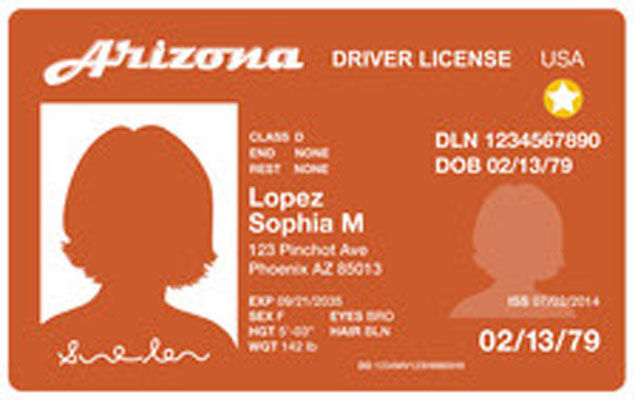The federal government has extended the deadline for a federally-compliant form of ID for two more years.
Contributed Article
PHOENIX – The U.S. Department of Homeland Security has again extended the deadline for domestic airline travelers to have a federally-compliant form of ID. The new date is May 7, 2025. The Arizona Department of Transportation Motor Vehicle Division follows TSA guidelines and still encourages people to consider getting the Arizona Travel ID to avoid delays or other travel issues at TSA checkpoints once this takes effect.
Beginning May 7, 2025, you will need a federally-compliant credential — like the Arizona Travel ID – to get past TSA checkpoints at airports for domestic flights. For most people, the main reason to get the Arizona Travel ID is that it will make travel easier. Without the Arizona Travel ID or another form of federally-compliant identification such as a valid U.S. Passport, fliers risk missing an airline flight because the standard driver’s license will not be accepted at TSA checkpoints.
This credential is distinguished by a star in the upper right corner and is available to Arizona residents as a driver’s license or identification card.
You can walk into an office for this service, but we suggest scheduling an appointment which can be done online at azmvdnow.gov. Even if you haven’t activated your AZ MVD NOW account, you can still schedule a Travel ID appointment.
Because the Arizona Travel ID is compliant with federal standards, you will need to provide extra documentation. This includes proof of identity: a birth certificate or U.S. passport; Social Security number: just the number, not the card; and two documents proving Arizona residency: rental or bank statements, credit card or cell phone bills in your name with your current Arizona address, etc. More information and a full list of qualifying documents are available at azdot.gov/TravelID
On Monday, the Department of Homeland Security (DHS) announced its intent to extend the REAL ID full enforcement date by 24 months, from May 3, 2023, to May 7, 2025. Under the new regulations published to execute this change, states will now have additional time to ensure their residents have driver’s licenses and identification cards that meet the security standards established by the REAL ID Act. As required by the law, following the enforcement deadline, federal agencies, including the Transportation Security Administration (TSA), will be prohibited from accepting driver’s licenses and identification cards that do not meet these federal standards.
“DHS continues to work closely with U.S. states, the District of Columbia, and the U.S. territories to meet REAL ID requirements,” said Secretary of Homeland Security Alejandro N. Mayorkas. “This extension will give states needed time to ensure their residents can obtain a REAL ID-compliant license or identification card. DHS will also use this time to implement innovations to make the process more efficient and accessible. We will continue to ensure that the American public can travel safely.”
The extension is necessary, in part, to address the lingering impacts of the COVID-19 pandemic on the ability to obtain a REAL ID driver’s license or identification card. REAL ID progress over the past two years has been significantly hindered by state driver’s licensing agencies having to work through the backlogs created by the pandemic. Many of these agencies took various steps in response to the pandemic including automatically extending the expiration dates of driver’s licenses and identification cards and shifting operations to appointment-only.
Passed by Congress in 2005 following a 9/11 Commission recommendation, the REAL ID Act establishes minimum security standards for state-issued driver’s licenses and identification cards. Security standards include incorporating anti-counterfeiting technology, preventing insider fraud, and using documentary evidence and record checks to ensure a person is who they claim to be. Under the new regulations, beginning May 7, 2025, every traveler 18 years of age or older will need a REAL ID-compliant driver’s license or identification card, state-issued enhanced driver’s license, or another TSA-acceptable form of identification at airport 1 security checkpoints for domestic air travel.
Since the enactment of the REAL ID Act in 2005, advancements in technology have enabled TSA to make significant improvements in checkpoint screening, particularly in the areas of identity management, on-person screening, accessible property screening, and alarm resolution. Through the deployment of technologies such as Advanced Imaging Technology (AIT), Advanced Technology (AT) X-ray, then Computed Tomography (CT), Bottled Liquids Scanners (BLS), and Credential Authentication Technology (CAT), as well as deployment of Passenger Screening Canines (PSC) and the rollout of TSA PreCheck®, TSA has continually advanced its security capabilities. TSA also increased its vetting capability through Secure Flight, a risk-based passenger prescreening program that enhances security by identifying low and high-risk passengers before they arrive at the airport by matching their names against trusted traveler lists and watchlists. REAL ID requirements will strengthen these improvements further by providing an additional layer of confidence in the identity of the traveler.
All 50 U.S. states, the District of Columbia, and four of five U.S. territories covered by the REAL ID Act and related regulations are issuing REAL ID-compliant driver’s licenses and identification cards. These standards have significantly improved the reliability and accuracy of state-issued driver’s licenses and identification cards.
For more information on REAL ID, visit www.dhs.gov/real-id.









